






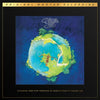
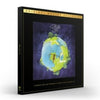
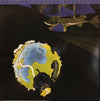
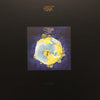
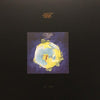


Yes - Fragile (2LP, 45 RPM, Box, 1STEP, SuperVinyl)
ORDER LIMITED TO ONE ITEM PER CUSTOMER
[click here to see more vinyl from Yes]
Jon Anderson – lead vocals, percussion, acoustic guitar on “We Have Heaven”
Steve Howe – electric and acoustic guitars, backing vocals
Chris Squire – bass guitars, backing vocals
Rick Wakeman – Hammond organ, grand piano, RMI 368 Electra-Piano and Harpsichord, Mellotron, Minimoog synthesiser
Bill Bruford – drums
Written by Jon Anderson (A1, B1-2, C2, D1), Johannes Brahms (A2 extracts from Brahms' 4th Symphony In E Minor, Third Movement), Chris Squire (B2, C3, D1), Bill Bruford (C1, D1), Steve Howe (A1, C4)
2 LPs, box set, gatefold jacket
Limited to 7,500 numbered copies
Original analog Master tape : YES
UD1S (UltraDisc One-Step)
Heavy Press : 180g - SuperVinyl
Record color : black
Speed : 45RPM
Size : 12”
Stereo
Studio
Record Press : RTI
Label : MOFI
Original Label : Atlantic
Recorded 11 August - 5 September 1971 at Advision Studios, London
Engineered & mixed by Eddy Offord
Produced by Yes
Remastered by Krieg Wunderlich
Originally released in 1971
Reissued in 2019
Tracks:
Side A:
- Roundabout
- Cans And Brahms
Side B:
- We Have Heaven
- South Side Of The Sky
Side C:
- Five Per Cent For Nothing
- Long Distance Runaround
- The Fish (Schindleria Praematurus)
- Mood For A Day
Side D:
- Heart Of The Sunrise
Awards :
TAS Super LP List! Special Merit: Informal
1000 Recordings You Must Hear Before You Die - Ranked 218
Reviews :
"Fragile was Yes' breakthrough album, propelling them in a matter of weeks from a cult act to an international phenomenon; not coincidentally, it also marked the point where all of the elements of the music (and more) that would define their success for more than a decade fell into place fully formed. The science-fiction and fantasy elements that had driven the more successful songs on their preceding record, The Yes Album, were pushed much harder here, and not just in the music but in the packaging of the album: the Roger Dean-designed cover was itself a fascinating creation that seemed to relate to the music and drew the purchaser's attention in a manner that few records since the heyday of the psychedelic era could match. Having thrown original keyboard player Tony Kaye overboard early in the sessions -- principally over his refusal to accept the need for the Moog synthesizer in lieu of his preferred Hammond organ -- the band welcomed Rick Wakeman into its ranks. His use of the Moog, among other instruments, coupled with an overall bolder and more aggressive style of playing, opened the way for a harder, hotter sound by the group as a whole; bassist Chris Squire sounds like he's got his amp turned up to "12," and Steve Howe's electric guitars are not far behind, although the group also displayed subtlety where it was needed. The opening minute of "Roundabout," the album opener -- and the basis for the edited single that would reach number 13 on the Billboard charts and get the group onto AM radio in a way that most other prog rock outfits could only look upon with envy -- was dominated by Howe's acoustic guitar and Bill Bruford's drums, and only in the middle section did the band show some of what they could do with serious amperage. Elsewhere on the record, as on "South Side of the Sky," they would sound as though they were ready to leave the ground (and the planet), between the volume and intensity of their playing. "Long Distance Runaround," which also served as the B-side of the single, was probably the most accessible track here apart from "Roundabout," but they were both ambitious enough to carry most listeners on to the heavier sides at the core of this long-player. The solo tracks by the members were actually a necessity: they needed to get Fragile out in a hurry to cover the cost of the keyboards that Wakeman had added to the group's sonic arsenal. But they ended up being more than filler. Each member, in effect, took a "bow" in mostly fairly serious settings, and Squire's "The Fish" and Howe's "Mood for a Day" pointed directly to future, more substantial projects as well as taking on a life of their own on-stage. If not exactly their peak, Fragile was as perfect a record as the group would ever make, and just as flawless in its timing as its content." AllMusic Review by Bruce Eder
"...The overall breadth of this One-Step offering brings into further focus both the collective and singular strengths of this definitive Yes incarnation. In fact, that's how you should listen to it - first to enjoy the compositional prowess of the whole, next to zero in on the contributions of the individual band members. That way, each successive spin will bear additional aural witness to Jon Anderson's clever "sharp, distance" whisper-to-a-scream lead-vocal choices saturating "Heart of the Sunrise", Bill Bruford's deft cymbal and stickwork throughout "Roundabout", Rick Wakeman's piano-key resonance during the transitional break in "South Side of the Sky", Steve Howe's adroit acoustic-string touches on "Mood for a Day", and Chris Squire's low-end thunder percolating the transition from "Long Distance Runaround" into "The Fish (Shindleria Praematurus)." There's no roundabout way of saying it: MoFi's One Step Fragile is a true heavyweight SuperVinyl champion." - Mike Mettler, The Absolute Sound Magazine, April 2020
UltraDisc One-Step : Instead of utilizing the industry-standard three-step lacquer process, Mobile Fidelity Sound Lab's new UltraDisc One-Step (UD1S) uses only one step, bypassing two processes of generational loss. While three-step processing is designed for optimum yield and efficiency, UD1S is created for the ultimate in sound quality. Just as Mobile Fidelity pioneered the UHQR (Ultra High-Quality Record) with JVC in the 1980s, UD1S again represents another state-of-the-art advance in the record-manufacturing process. MFSL engineers begin with the original master tapes and meticulously cut a set of lacquers. These lacquers are used to create a very fragile, pristine UD1S stamper called a "convert." Delicate "converts" are then formed into the actual record stampers, producing a final product that literally and figuratively brings you closer to the music. By skipping the additional steps of pulling another positive and an additional negative, as done in the three-step process used in standard pressings, UD1S produces a final LP with the lowest noise floor possible today. The removal of the additional two steps of generational loss in the plating process reveals tremendous amounts of extra musical detail and dynamics, which are otherwise lost due to the standard copying process. The exclusive nature of these very limited pressings guarantees that every UD1S pressing serves as an immaculate replica of the lacquer sourced directly from the original master tape. Every conceivable aspect of vinyl production is optimized to produce the most perfect record album available today.
MoFi SuperVinyl: The World's Quietest Surfaces and Cleanest Grooves: Developed by NEOTECH and RTI, MoFi SuperVinyl is the most exacting-to-specification vinyl compound ever created. Analog lovers have never seen (or heard) anything like it. Extraordinarily expensive and extremely painstaking to produce, the special proprietary compound addresses two specific areas of improvement: noise floor reduction and enhanced groove definition. The vinyl composition features a new carbonless dye (hold the disc up to the light and see) and produces the world's quietest surfaces. This high-definition formula also allows for the creation of cleaner grooves that are indistinguishable from the original lacquer. MoFi SuperVinyl provides the closest approximation of what the label's engineers hear in the mastering lab.
Ratings :
AllMusic : 5 / 5 , Discogs : 4,4 / 5 , The Absolute Sound : 5/5 Music, 5/5 Sonics






